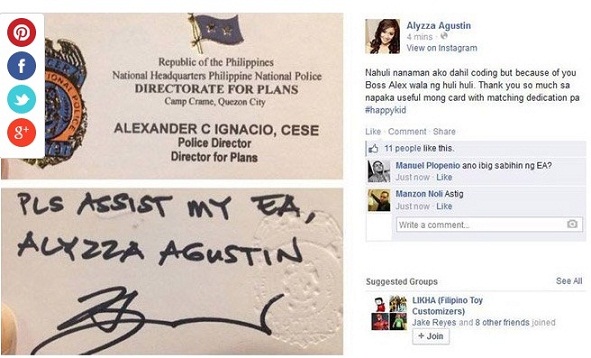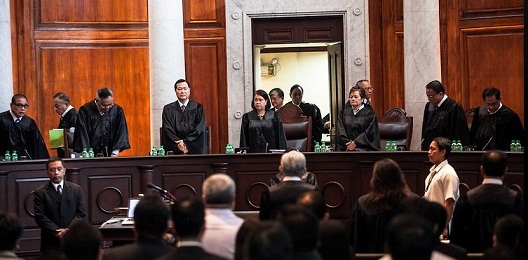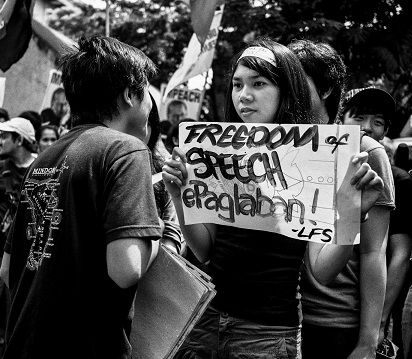
The incident involving car model Alyzza Agustin and Police Chief Superintendent Alexander Ignacio is one example of something good coming out of a stupid act.
God works in mysterious ways indeed.
Last Sept. 28, Agustin, who apparently enjoys social media but does not comprehend it’s power and perils proudly posted in her Facebook and Instagram accounts that she was able to get away violating the color coding traffic scheme in Metro Manila by using a calling card Ignacio gave her.
She bragged: “Nahuli na naman ako dahil coding but because of you Boss Alex wala ng huli-huli. Thank you so much sa napaka-useful mong card with matching dedication pa.”
She even posted the calling card of Ignacio and with a signed note at the back which said: “Please assist my EA, Alyzza Agustin.”
EA is understood to be Executive Assistant.
Of course the traffic policeman let Ignacio’s EA get away with the violation which ordinary motorists who are not the EA of any government official would not have escaped without paying a fine and undergo so many hassles.
It was a good thing Agustin didn’t realize the perils of social media (Facebook, Twitter, Instagram): that there’s nothing private once posted. There’s no such thing as limiting your message to your friends because the friends of your friends can share what they find interesting, intriguing, infuriating.
That’s what happened to Agustin’s post. Several netizens reacted to it because it showed misuse of authority on the part of Santiago.
President Aquino’s “no wang-wang” policy was most applauded because it was supposed to put government officials into their proper role as public servants. A government position is not supposed to be a position of privilege to be used to put officials above the long- suffering ordinary citizens.
The color coding scheme was devised to ease traffic in Metro Manila which is a daily curse to commuters and motorists. Giving one an exemption for a flimsy reason that she is a friend of an official makes a mockery of the regulation and rubs salt to the suffering of the commuters and motorists.
That’s why Agustin’s post drew collective ire.
Ignacio now denies that Agustin was his EA. So what was she?
Someone must have told Agustin what a stupid thing she did because she later deleted those posts. Too late. In social media, once posted, it’s spread (goes viral) and it cannot be recalled.
Not even her apology could undo what she did: “I would like to apologize to everyone who was affected and offended by my post: fellow motorists, Director Alexander C. Ignacio and his family, and the PNP institution as a whole. I was just overwhelmed by that moment because I was caught in traffic for hours coming from work.
I would like to make it a point that I do not know Director Alexander C. Ignacio personally. I mean no harm to anyone, and just like any Filipino motorist, I would like a little convenience on the road. Naniniwala po ako na ang bawat isa sa atin ay may pagkukulang din naman sa daan. Pasensya na po sa aking pagkakamali.”
Ignacio declared that he is “not a womanizer” and complained that his family “ including my ailing mother, is badly affected by this scandal.”
Upon arriving from Malaysia, where he attended an ASEAN Police Conference, he requested “ for private moments “with his family.
He also said he is consulting with his lawyers about filing of charges against Agustin for “moral damages caused by the calling card scandal.”
It’s so funny.
Hooray for social media!

